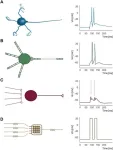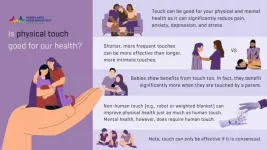(Press-News.org) The biological brain, especially the human brain, is a desirable computing system that consumes little energy and runs at high efficiency. To build a computing system just as good, many neuromorphic scientists focus on designing hardware components intended to mimic the elusive learning mechanism of the brain. Recently, a research team has approached the goal from a different angle, focusing on measuring information transfer instead. Their method went through biological and simulation experiments and then proved effective in an electronic neuromorphic system. It was published Feb. 1 in Intelligent Computing, a Science Partner Journal.
Although electronic systems have not fully replicated the complex information transfer between synapses and neurons, the team has demonstrated that it is possible to transform biological circuits into electronic circuits while maintaining the amount of information transferred. "This represents a key step toward brain-inspired low-power artificial systems," the authors note.
To evaluate the efficiency of information transfer, the team drew inspiration from information theory. They quantified the amount of information conveyed by synapses in single neurons, then measured the quantity using mutual information, the analysis of which reveals the relationship between input stimuli and neuron responses.
First, the team conducted experiments with biological neurons. They used brain slices from rats, recording and analyzing the biological circuits in cerebellar granule cells. Then they evaluated the information transmitted at the synapses from mossy fiber neurons to the cerebellar granule cells. The mossy fibers were periodically stimulated with electrical spikes to induce synaptic plasticity, a fundamental biological feature where the information transfer at the synapses is constantly strengthened or weakened with repeated neuronal activity.
The results show that the changes in mutual information values are largely consistent with the changes in biological information transfer induced by synaptic plasticity. The findings from simulation and electronic neuromorphic experiments mirrored the biological results.
Second, the team conducted experiments with simulated neurons. They applied a spiking neural network model, which was developed by the same research group. Spiking neural networks were inspired by the functioning of biological neurons and are considered a promising approach for achieving efficient neuromorphic computing.
In the model, four mossy fibers are connected to one cerebellar granule cell, and each connection is given a random weight, which affects the information transfer efficiency like synaptic plasticity does in biological circuits. In the experiments, the team applied eight stimulation patterns to all mossy fibers and recorded the responses to evaluate the information transfer in the artificial neural network.
Third, the team conducted experiments with electronic neurons. A setup similar to those in the biological and simulation experiments was used. A previously developed semiconductor device functioned as a neuron, and four specialized memristors functioned as synapses. The team applied 20 spike sequences to decrease resistance values, then applied another 20 to increase them. The changes in resistance values were investigated to assess the information transfer efficiency within the neuromorphic system.
In addition to verifying the quantity of information transferred in biological, simulated and electronic neurons, the team also highlighted the importance of spike timing, which as they observed is closely related to information transfer. This observation could influence the development of neuromorphic computing, given that most devices are designed with spike-frequency-based algorithms.
END
Brain-inspired computing may boil down to information transfer
Researchers test biological soundness of artificial network using information theory
2024-04-08
ELSE PRESS RELEASES FROM THIS DATE:
Youths with mood disorders 30 percent less likely to acquire driver’s license than peers
2024-04-08
Philadelphia, April 8, 2024 – Researchers from Children’s Hospital of Philadelphia (CHOP) found that teens and young adults with mood disorders, such as depression and bipolar disorder, were 30% less likely to obtain their driver’s license than peers without such disorders. Additionally, those youths with mood disorders experienced a slightly elevated risk of crashing. These findings suggest that these teens and young adults could benefit from guidance on obtaining licensure and accessing training to avoid crashes when they are newly licensed.
The findings were published online today ...
Opening a new front against pancreatic cancer
2024-04-08
NEW YORK, NY (April 8, 2024)--A new type of investigational therapeutic in development for pancreatic cancer has shown unprecedented tumor-fighting abilities in preclinical models of the disease, suggesting it has the potential to offer novel treatment options for nearly all pancreatic tumors, a comprehensive study has found.
The inhibitors in this new class of oral medications, being developed by Revolution Medicines Inc., target the oncogenic or active cancer-causing form of RAS proteins (such as KRAS, NRAS, and HRAS). These RAS “oncoproteins” drive up to a third of all human cancers. The research ...
More premature babies born following Swedish parental leave policy
2024-04-08
The introduction of a policy protecting parental leave benefits in Sweden in 1980 had unintended consequences on child health. The policy led to an increase in premature birth rates. This is shown by a study from researchers at Stockholm University, published in JAMA Pediatrics.
The Swedish so-called speed premium policy was introduced in 1980 in order to protect couples’ level of income-based parental leave benefits when they had children in quick succession. The new study from Stockholm University evaluates the health consequences of the policy. The researchers conclude that by ...
Immune key to chronic viral infections discovered
2024-04-08
IMMUNE KEY TO CHRONIC VIRAL INFECTIONS DISCOVERED
Australian researchers have discovered a previously unknown rogue immune cell that can cause poor antibody responses in chronic viral infections. The finding, published today (9 April) in the journal, Immunity, may lead to earlier intervention and possibly prevention of some types of viral infections such as HIV or hepatitis.
One of the remaining mysteries of the human immune system is why a certain cell, called a B cell, which retains a memory for past infections – ensuring we fight off diseases we have experienced before – often only has a weak capacity to protect us from persistent infections.
Researchers ...
PFAS ‘forever chemicals’ above drinking water guidelines in global source water
2024-04-08
Per-and poly-fluoroalkyl substances – commonly known as PFAS – are a group of over 14,000 human-made chemicals that have been popular since the 1950s for their diverse skills in resisting heat, water, grease and stains.
They’ve been commonly found in household products like non-stick frypans, clothing, cosmetics, insecticides, and food packaging, as well as specialty industry products, like firefighting foam.
But despite their broad skillset, the chemicals have a dark side: they’re known as ‘forever chemicals’ as once they’re in the environment – ...
How the moon turned itself inside out
2024-04-08
About 4.5 billion years ago, a small planet smashed into the young Earth, flinging molten rock into space. Slowly, the debris coalesced, cooled and solidified, forming our moon. This scenario of how the Earth's moon came to be is the one largely agreed upon by most scientists. But the details of how exactly that happened are "more of a choose-your-own adventure novel," according to researchers in the University of Arizona Lunar and Planetary Laboratory who published a paper in Nature Geoscience. The findings offer important insights into the evolution ...
Climate change threatens Antarctic meteorites
2024-04-08
Using artificial intelligence, satellite observations, and climate model projections, a team of researchers from Switzerland and Belgium calculate that for every tenth of a degree of increase in global air temperature, an average of nearly 9,000 meteorites disappear from the surface of the ice sheet. This loss has major implications, as meteorites are unique samples of extraterrestrial bodies that provide insights into the origin of life on Earth and the formation of the Moon.
Disappearing at an alarming rate
By 2050, about a quarter of the estimated of 300,000 - 800,000 meteorites in Antarctica will be lost ...
New study highlights the benefit of touch on mental and physical health
2024-04-08
Through a large-scale analysis, researchers at the Netherlands Institute for Neuroscience have uncovered the ways in which consensual touch can benefit a person’s physical and mental wellbeing.
You might recognize the comforting feeling when someone offers you a hug at the end of a stressful day or strokes your shoulder when you’re feeling down. But the question remains: can touch really help you feel better, and does it matter who it’s from or how they touch you? To explore these questions, researchers from the Social Brain Lab at the Netherlands Institute for Neuroscience and the University Hospital ...
Wyss Institute’s AminoX project receives funding from Northpond Labs to accelerate innovation in protein-based therapeutics
2024-04-08
(BOSTON) — The Wyss Institute for Biologically Inspired Engineering at Harvard University and Northpond Ventures announced today that the VC firm’s affiliate Northpond Labs has signed an agreement to support the development of the AminoX project toward commercialization. This is the fourth Wyss project selected by Northpond Labs for additional funding.
Established in 2020 with the involvement of Harvard’s Office of Technology Development, the five-year strategic research alliance created The Laboratory for Bioengineering Research and Innovation at the Wyss Institute through a $12 million commitment from Northpond Labs to support impactful research ...
How scientists are accelerating chemistry discoveries with automation
2024-04-08
A new automated workflow developed by scientists at Lawrence Berkeley National Laboratory (Berkeley Lab) has the potential to allow researchers to analyze the products of their reaction experiments in real time, a key capability needed for future automated chemical processes.
The developed workflow – which applies statistical analysis to process data from nuclear magnetic resonance (NMR) spectroscopy – could help speed the discovery of new pharmaceutical drugs, and accelerate the development of new chemical reactions.
The Berkeley Lab scientists who developed the groundbreaking technique ...
LAST 30 PRESS RELEASES:
Cost of copper must rise double to meet basic copper needs
A gel for wounds that won’t heal
Iron, carbon, and the art of toxic cleanup
Organic soil amendments work together to help sandy soils hold water longer, study finds
Hidden carbon in mangrove soils may play a larger role in climate regulation than previously thought
Weight-loss wonder pills prompt scrutiny of key ingredient
Nonprofit leader Diane Dodge to receive 2026 Penn Nursing Renfield Foundation Award for Global Women’s Health
Maternal smoking during pregnancy may be linked to higher blood pressure in children, NIH study finds
New Lund model aims to shorten the path to life-saving cell and gene therapies
Researchers create ultra-stretchable, liquid-repellent materials via laser ablation
Combining AI with OCT shows potential for detecting lipid-rich plaques in coronary arteries
SeaCast revolutionizes Mediterranean Sea forecasting with AI-powered speed and accuracy
JMIR Publications’ JMIR Bioinformatics and Biotechnology invites submissions on Bridging Data, AI, and Innovation to Transform Health
Honey bees navigate more precisely than previously thought
Air pollution may directly contribute to Alzheimer’s disease
Study finds early imaging after pediatric UTIs may do more harm than good
UC San Diego Health joins national research for maternal-fetal care
New biomarker predicts chemotherapy response in triple-negative breast cancer
Treatment algorithms featured in Brain Trauma Foundation’s update of guidelines for care of patients with penetrating traumatic brain injury
Over 40% of musicians experience tinnitus; hearing loss and hyperacusis also significantly elevated
Artificial intelligence predicts colorectal cancer risk in ulcerative colitis patients
Mayo Clinic installs first magnetic nanoparticle hyperthermia system for cancer research in the US
Calibr-Skaggs and Kainomyx launch collaboration to pioneer novel malaria treatments
JAX-NYSCF Collaborative and GSK announce collaboration to advance translational models for neurodegenerative disease research
Classifying pediatric brain tumors by liquid biopsy using artificial intelligence
Insilico Medicine initiates AI driven collaboration with leading global cancer center to identify novel targets for gastroesophageal cancers
Immunotherapy plus chemotherapy before surgery shows promise for pancreatic cancer
A “smart fluid” you can reconfigure with temperature
New research suggests myopia is driven by how we use our eyes indoors
Scientists develop first-of-its-kind antibody to block Epstein Barr virus
[Press-News.org] Brain-inspired computing may boil down to information transferResearchers test biological soundness of artificial network using information theory






